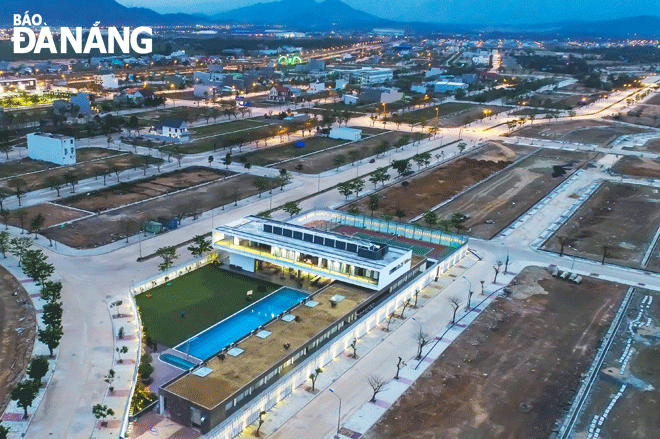Solutions to ensure real estate market development
The Vietnamese Ministry of Construction has issued a notice on the disclosure of information on housing and the real estate market in 2022 and outlined proposals and recommendations for a number of solutions and tasks to ensure the market development in 2023.
 |
| The Da Nang real estate market is seeing a deep decline in prices such as land plots down VND 500 million/apiece but very few transactions. Some real estate projects are seen in the west of Da Nang. Photo: N.PHUONG |
Localities actively remove difficulties and obstacles
The Vietnamese Ministry of Construction has coordinated with other relevant agencies to make a list of projects, review land fund, complete legal procedures, select investors to implement projects of social housing, housing for industrial park workers, renovating and rebuilding of old apartment buildings.
In particular, the project ‘Building at least 1 million social housing apartments for low-income people, workers in industrial parks in the 2021 - 2030 period is still on track.
Especially for nationwide localities, the Ministry of Construction has requested them to make a list of housing and real estate projects, especially stagnant ones.
On that basis, focus are placed on solving legal difficulties and procedures for preparing investment in housing projects to increase supply for the market, speeding up and reforming administrative procedures, avoiding delays in handling procedures for implementing real estate projects in the city.
Localities shall also promote the auction of land use rights, biddings for projects using land to select investors for the development of commercial housing projects for the real estate market, focus on socio-economic recovery and development programmes.
The State Bank does not tighten credit in real estate
On February 8, the State Bank of Viet Nam (SBV) held a conference on real estate credit. According to SBV Governor Nguyen Thi Hong, to remove difficulties for the market, many different policies are needed, including credit policies.
“In fact, the SBV has not yet issued any document on the issue of tightening credit in real estate. Lending depends on the appraisal of businesses by credit institutions, but still ensures operational safety”, said Hong.
In 2023, the credit growth orientation is about 14 - 15 15%, but adjusted according to the real situation. If inflation allows, credit management may be more flexible or vice versa.
With a regard to the operating orientation in 2023, in order to implement credit solutions to remove difficulties and obstacles for real estate businesses, organisations and individuals when accessing credit capital, the system must still be safe.
“The difficulties and problems of the real estate market need solutions from all ministries and municipal/principal administration. To remove difficulties for the real estate market, greater efforts are needed not only from the banking system, but also from businesses and projects that must be transparent and qualified. Enterprises also have to self-structure in order to match their financial capacity and cash flow management ability…”, added Hong.
|
Credit for real estate is much higher than average As reported by SBV, from 2017-2019, before the Covid-19 outbreak, credit in the real estate sector grew by over 20% per year, higher than the overall credit growth rate of the economy (from 13-14%) and kept the 18 - 19% proportion of the total credit balance of the national economy. In 2020 and 2021, under the impact of Covid-19, real estate credit balance still recorded growth, but at a lower rate than previous years, increasing by 12.06% and 15.37% in 2020 and 2021, respectively. By the end of 2022, the total outstanding loans credit institutions gave to the real estate sector had reached about VND 2,580,000 billion, up about 24% compared to 2021, which was one of the high growth areas, accounting for 21.2% of the total outstanding loans of the national economy and the bad debt ratio was 1.81%. In terms of credit quality, in 2022, the bad debt ratio for the real estate sector tended to gradually increase, up to now 1.81% whilst 1.67% recorded in 2021. Recently, a number of real estate enterprises have committed violations in the issuance of bonds, causing loss of confidence of investors, affecting capital mobilisation activities in the bond market. In addition to having to deal with maturing bonds, many businesses enterprises also buy back corporate bonds before maturity. This concerning fact will put pressure on cash flow, financial situation of enterprises as well as bank credit flows. For the time being, the SBV directs credit institutions to grow credit safely and effectively, meeting capital for the economy, including the real estate sector, improve credit quality and enhance access to credit capital by people and businesses. |
Reporting by GIA PHUC - Translating by A.THU